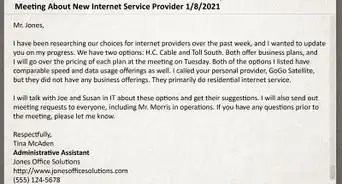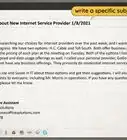This article was co-authored by Chloe Carmichael, PhD. Chloe Carmichael, PhD is a Licensed Clinical Psychologist who runs a private practice in New York City. With over a decade of psychological consulting experience, Dr. Chloe specializes in relationship issues, stress management, self esteem, and career coaching. She has also instructed undergraduate courses at Long Island University and has served as adjunct faculty at the City University of New York. Dr. Chloe completed her PhD in Clinical Psychology at Long Island University in Brooklyn, New York and her clinical training at Lenox Hill Hospital and Kings County Hospital. She is accredited by the American Psychological Association and is the author of “Nervous Energy: Harness the Power of Your Anxiety” and “Dr. Chloe's 10 Commandments of Dating.”
There are 8 references cited in this article, which can be found at the bottom of the page.
This article has been viewed 36,281 times.
Giving a presentation in front of your boss can be a very nerve-wracking experience. Sometimes a raise or promotion might even depend on how well your presentation goes. Using music or sound in your PowerPoint presentation is a good way of livening up your talk. However, this may not be enough or as easy as it sounds. For a truly impressive presentation, you’ll need to take it a step further and consider things like how to dress, how to speak, and how your audience will interpret the content of your presentation. With a little work and planning, you can impress your boss with your presentation.
Steps
Creating an Effective Presentation
-
1Know your audience. In order to give an effective presentation, you need to consider your audience. Are you presenting in front of a group of students or before the top management of your company? Students would appreciate a fun presentation but you will most likely need to keep your presentation for your bosses more formal.[1]
- This can affect many aspects of your presentation – from the kind of music you choose to the type of clothes you wear.
- A more formal presentation in front of your boss or other executives from your company would require formal business attire (suit for men, business suit or nice dress for women) and more formal sounding music accompaniment (like elevator music), while a presentation in front of students might warrant more casual attire (slacks and button-up shirt for men, slacks and a nice top for women) and even allow for more contemporary/fun music along with your presentation.
-
2Consider the environment. The context in which you’re giving the presentation is something to consider as well. If your presentation occurs during a big business conference, this might be a more formal affair than a presentation in a conference room at your office. Consider what adjustments you might need to make based on the context of the event.[2]
- Consider the venue. As it relates to the tips above, a formal setting (like a conference room or auditorium) will require a formal presentation whereas a presentation given more casually in your boss’s office might require fewer formalities.[3]
Advertisement -
3Thoroughly research your topic. Is it a report on the different kinds of personalities for your psych class? Are you doing a product presentation to top management in your company? Are you giving your boss a status update on a new project? Once you know the topic of your presentation, it will be easier to visualize the sound or music you want to play in the background.
-
4Be well organized. Good organization reflects well on you in more ways than one. Not only does it show your boss that you are capable of handling pieces of information and crafting them into a cohesive presentation that is valuable to others, it also shows that you are more dependable and capable than some other less-organized employees.[4]
- Have your presentation flow in a logical and informative way. Have your notes lined up with you visuals – using clear cues for yourself so you don’t get mixed up.
-
5Include visual aids. Visuals always help a presentation look more polished and professional. They allow the audience members to have something more concrete to hold on to during your presentation rather than just trying to connect to abstract words.[5]
- Put all of the data into a spreadsheet and make copies for everyone at the meeting. Or create a PowerPoint slide show to go along with your presentation.
- An effective PowerPoint presentation includes high quality visual images instead of cheesy clip-art, works to limit the amount of text that appears on each slide, and presents data in a logical sequence that is easy to follow along with.[6]
Delivering a Great Presentation
-
1Look professional. A work presentation is an occasion to dress up more formally, even if the place you work at allows more casual attire. You are representing yourself and how you want others to view you and your outfit will be one of the first things they notice. Set the tone early with impressive attire.[7]
- For men, wear slacks, a suit jacket, and a tie. For women, wear a nice dress or a business suit.
- And remember that you are representing your company, by extension, when you are presenting – so you want to dress accordingly.
-
2Sound confident. Your boss will not be impressed if you sound like a meek, scared person during your presentation. You should project the image of a confident person, someone who knows what they are talking about and whose opinions should be valued.[8]
- This means that you should use confident body language like not crossing your arms, making eye contact, and standing up straight.
- You can try practicing at home ahead of time and asking a friend to tell you if they think you are speaking with confidence.
- If you make a mistake, just keep going. You can correct yourself, but don’t draw more attention to your mistake by dwelling on it or by being obviously embarrassed. Everyone makes mistakes, but the way you recover from yours will be what your boss remembers the most.
-
3Be clear and concise. Make sure you are being as informative as possible in as brief a time as possible. Giving a great presentation is all about providing clear information in small, easily digestible quantities. Make sure you don’t go off on tangents. Stick to the topic at hand throughout the presentation.
- Speak with a steady pace. Talking quickly can be perceived as a sign of nervousness, so slow your words down during your presentation. If you speak too quickly, you may stumble over your words more frequently as well, so make a conscious effort to slow it down.
- It may also be harder for your audience to grasp and digest the ideas you’re discussing if you say everything too quickly.
-
4Be prepared. Make sure you know your material inside and out. When giving a presentation, you are the expert, so you need to be the most informed person about the topic. You should be able to answer any questions people have and be able to explain the complex ideas within the presentation topic clearly.
- Try to think ahead to what questions people might have about the topic – maybe what questions you had when you first started working on the project – and explain it to your audience from that perspective.
- Try saying things like, “This may seem like an overwhelming amount of information, but I’ll walk you through it.” Or, “Let me take you through the process step-by-step.”
Impressing Your Boss With Your Dedication
-
1Be prepared to answer questions. Show your boss that you really know your stuff and that you’re able to think on your feet during the Q and A portion of your presentation. These skills will really impress your boss and show him or her that you are more than competent.
- If someone asks a question you don’t know the answer to, give a positive response about how you are going to look into that further – something like, “What a great suggestion. I haven’t fully developed that aspect of the project yet, but I will absolutely consider this as I move forward.”
-
2Schedule a follow-up meeting with your boss. Once the presentation is over, try to schedule a follow-up meeting with your boss as soon as possible. You want to get the meeting in while your presentation is still fresh on your boss’s mind so that they can give you honest feedback, but also so they’ll remember what a stellar job you did.
- This kind of follow through after the presentation will impress your boss with your dedication to the work and doing a good job for the company.
-
3Listen to feedback. A presentation is a great opportunity for you to be less formally evaluated by others at your place of employment. Ask your boss or fellow colleagues to give you some honest feedback about your presentation and the work you perform on a daily basis. This will impress your boss because it will show that you are open to feedback and willing to adapt in changing environments.
- Take the feedback to heart and implement any helpful changes that you might receive as constructive criticism.
EXPERT TIPChloe Carmichael, PhD is a Licensed Clinical Psychologist who runs a private practice in New York City. With over a decade of psychological consulting experience, Dr. Chloe specializes in relationship issues, stress management, self esteem, and career coaching. She has also instructed undergraduate courses at Long Island University and has served as adjunct faculty at the City University of New York. Dr. Chloe completed her PhD in Clinical Psychology at Long Island University in Brooklyn, New York and her clinical training at Lenox Hill Hospital and Kings County Hospital. She is accredited by the American Psychological Association and is the author of “Nervous Energy: Harness the Power of Your Anxiety” and “Dr. Chloe's 10 Commandments of Dating.”Clinical Psychologist & Executive Coach
 Chloe Carmichael, PhD
Chloe Carmichael, PhD
Clinical Psychologist & Executive CoachLook at criticism as a learning opportunity instead of a negative comment. If your boss gives you constructive criticism, that's a good sign! It means they want you to be better at your job. Reframing what you perceive as negative feedback as a chance to learn will allow you to develop personally and professionally.
-
4Ask for more responsibility. Once you have shown your boss that you know what you are talking about, ask him or her for some more responsibility within your current role. This is a great way to impress your boss. Asking for more responsibility at work without demanding a corresponding raise shows that you are committed to the job.
- Try saying something like, “I would really love to continue growing and developing my role within the company. If you are open to it, I would like to take on some additional responsibilities around the office.”
References
- ↑ https://www.americanexpress.com/us/small-business/openforum/articles/how-to-keep-your-audience-focused-on-your-presentation/
- ↑ http://www.skillsyouneed.com/present/presentation-method.html
- ↑ http://www.duarte.com/know-the-presentation-venue/
- ↑ https://www.themuse.com/advice/how-to-dazzle-your-boss-and-everyone-else-in-an-important-meeting
- ↑ https://www.linkedin.com/pulse/two-genius-ways-impress-your-boss-tracey-harrington-mccoy
- ↑ http://www.garrreynolds.com/preso-tips/design/
- ↑ http://money.usnews.com/money/blogs/outside-voices-careers/2012/06/20/10-smart-tips-to-impress-the-boss-your-first-day
- ↑ http://www.businessinsider.com/how-to-make-a-presentation-that-will-impress-your-boss-2015-7








































































